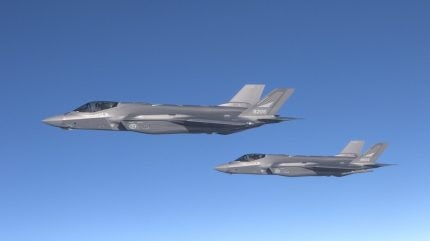
The Norwegian Air Force has taken a pioneering step by integrating sustainable aviation fuel (SAF) into the operation of its F-35 fighter jets.
The jets were powered with a blend consisting of 40% biofuel. Although the scheduled flight at Ørland was halted on 15 January 2025 due to unfavourable weather conditions, a successful test flight using this fuel mixture was conducted the previous day.
SAF includes biofuels and synthetic aviation fuels, and other recycled carbon fuels. Currently, biofuel derived from waste, residues, and by-products is being used.
This initiative with the F-35 jets lays the groundwork for future advancements in sustainable practices within the defence sector.
Despite the F-35’s compatibility with SAF, Norway faces obstacles related to the fuel’s accessibility and the nation’s production capabilities.
Defence Minister Bjørn Arild Gram views sustainable aviation fuel as a climate-friendly option for the Air Force, given the challenges of electrifying F-35 jets.
He stressed the importance of additional efforts to reduce emissions.
Bjørn Arild Gram said: “Our fighter jets currently account for about one-third of direct CO₂ emissions within the defence sector. Using sustainable fuel can reduce emissions and strengthen supply security. The aim is to contribute to achieving climate targets while enhancing preparedness.”
Ørland is exploring a variety of eco-friendly measures, with SAF being a key component. This initiative is complemented by trials involving portable hybrid units that integrate wind and solar energy technologies.
These units have the capability to accumulate power and can be utilised in different locations, thereby improving the autonomy and adaptability of military operations.
Bjørn Arild Gram added: “We have presented an ambitious long-term defence plan, significantly increasing the activity level of the Armed Forces. This requires us to take responsibility for reducing our climate and environmental impact, while maintaining preparedness and operational capability. This is not just about climate; it is also about technological development and preparedness. Local production of sustainable aviation fuel could decrease our dependence on lengthy supply chains.”
Norway has reportedly received approximately 40 of the 52 conventional take-off and landing F-35As that it plans to acquire.
As per GlobalData’s report titled ‘Norway Defense Market Size, Trends, Budget Allocation, Regulations, Acquisitions, Competitive Landscape and Forecast to 2028’, the country’s defence budget is expected to increase steadily with annual growth rates surpassing 4% CAGR during 2024-2028.



